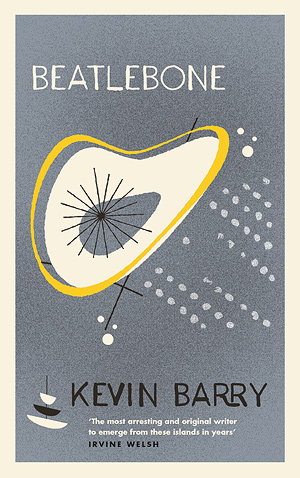Beatlebone by Kevin Barry is reviewed by Laura Kenwright to be a memorable experience for the reader which shifts narrative expectations and conventions.
‘Turns out it’s the thought of the fucking thing’ (Beatlebone, p. 234)
 Kevin Barry’s 2015 Goldsmiths Prize-winning novel Beatlebone is an imagined version of what happened when John Lennon visited the island Dorinish in Clew Bay, County Mayo, that he bought in 1967 (the island buying is true). This is a vibrant novel, the subject matter and prose creating an almost hallucinogenic effect during, and after, reading.
Kevin Barry’s 2015 Goldsmiths Prize-winning novel Beatlebone is an imagined version of what happened when John Lennon visited the island Dorinish in Clew Bay, County Mayo, that he bought in 1967 (the island buying is true). This is a vibrant novel, the subject matter and prose creating an almost hallucinogenic effect during, and after, reading.
Barry’s prose is characterised by its succinct potency and remarkable, memorable sentences. Beatlebone is incredibly funny. Glide through the anger and tension between the characters and their eerie, claustrophobic landscapes and the humour sparkles: ‘She gave me four sausage rolls when I done my holy communion.’ The section in the Amethyst Hotel is terrifyingly hilarious (a Chris Morris or Stewart Lee type of funny, it’s not for the faint-hearted) as a group of alternative misfits (societal and with each other) attempt to cleanse themselves through engaging in Primal Scream therapy, ‘the rants’: ‘You lost your mam, didn’t you, John? / Oh here we fucking go.’ Additionally, only Barry could come up with a situation where John Lennon, in a West of Ireland pub, disguises himself as a chap called Kenneth from Coventry with a speech impediment.
The action for most of the book takes place over three days. There’s a pervading sense that time is fragile, and that how we fill it and who we fill it with is delicate and important: ‘Time is not fixed down at all.’ / ‘the years are peeling off and time is shifting.’ Mortality, and our lack of control over time is one of the preoccupations of Beatlebone: ‘The hours he spends in the chair are like years – He is a boy. He is a man. He is a very very old man.’
Cornelius, John’s fixer, is a gloriously neurotic layman, part-seer, part-father figure to John. He is a man tasked with a job that he will deliver on, eventually, but his bizarre mannerisms and nervous energy heighten the sense of claustrophobia created as the two characters collide: ‘Would you mind sitting down, John, he says. You’re making me dizzy.’
The novel is divided into nine parts, as a cap tip to John Lennon’s fascination with the number and it is Part Six that most immediately provokes questions of literary form and voice, where suddenly as readers we are joined by the undisguised narrative voice of Kevin Barry describing some of the challenges of writing and researching the novel:
‘I was operating at the usual deep thrum of anxiety and fretfulness. I was worried about both the feeds for my material and how I might subsequently arrange it.’
This biographical chapter is an effective anomaly, echoing the ideas of the artist in creation, the artist seeking inspiration, the artist battling neuroses that run throughout the novel in John’s palpable anxiety: ‘I’m fucking anxiety.’
There’s a smack of Waiting for Godot in Beatlebone. The elemental landscapes, the preoccupation with waiting for something that will inevitably not live up to its expectations (John does reach his island, but for how long and how successful that trip is I will leave you to discover yourself) and experimentation with form are all reminiscent of Beckett’s absurdist play.
Beatlebone is a truly glorious book. It shifts narrative expectations and conventions, a distinctive style that echoes the fraughtness of the characters and plot. I do hope Yoko Ono has read it, or will read it, and enjoys its bizarre playfulness and artistry. I’ll leave you with the wise words of Charlie, John’s sound engineer at the end of the book, to summarise Beatlebone: ‘You make the moments of a day and a life is what you do.’










